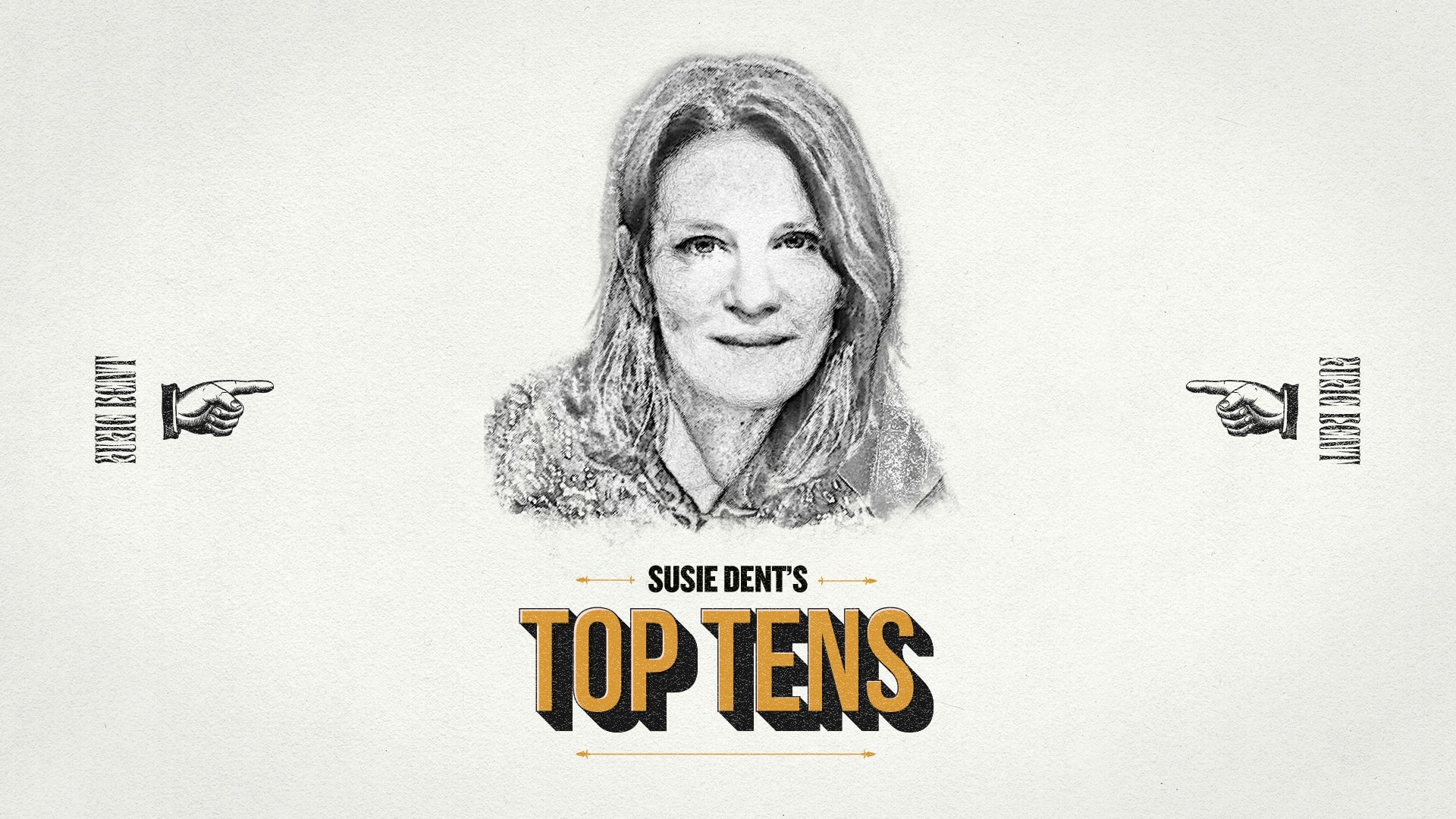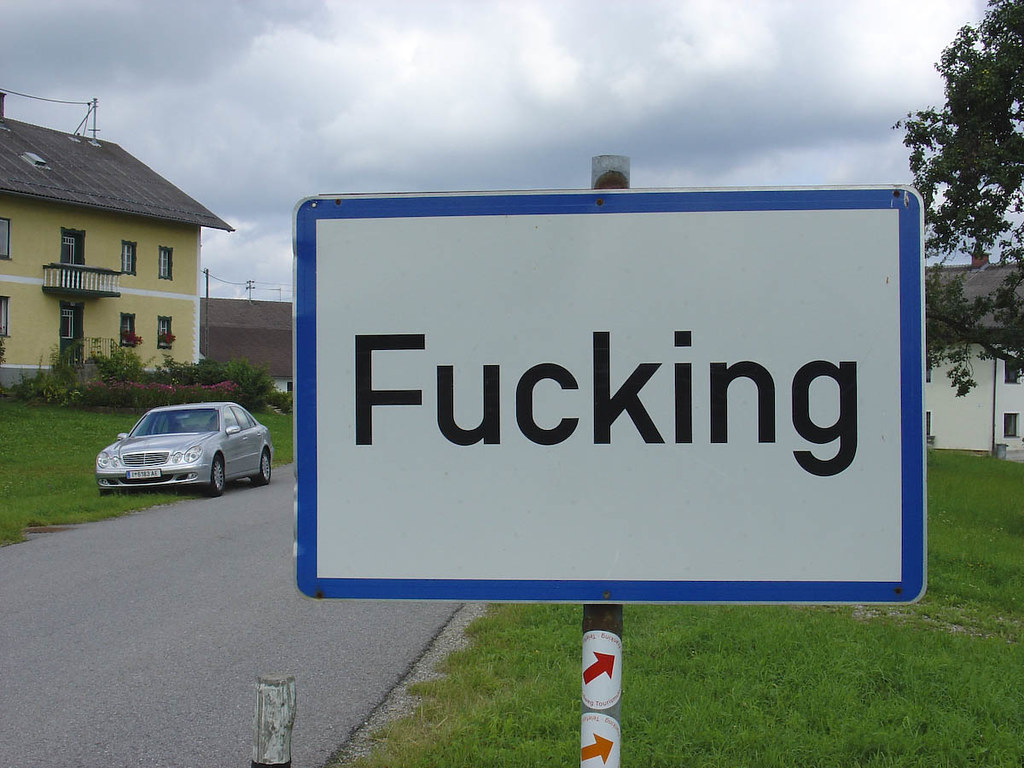
Susie Dent’s back. This week, she’s found a whole bunch of words that might get you in some trouble, but are actually really quite innocent. Honest!
“I can’t stand innuendo,” mused Kenneth Williams. “If I see one in a script, I whip it out immediately.” The word ‘innuendo’ comes straight from Latin, where it meant ‘by nodding at’, suggesting something subtly suggestive and oblique. Riffle through the dictionary, however, and you’ll find plenty of words that positively scream filth at you. Or that at least seem to, for dig a little beneath their surface and you will often discover that the joke is most definitely on you.
Here are ten terms that promise to only go one way, before taking a sharp turn into innocence.

A sign welcoming visitors to the village of Fucking, in northwestern Austria. The town changed its name to Fugging in 2020.
cummingtonite
A mineral found in some metamorphic rocks, the name ‘cummingtonite’ combines Cummington, a town in Massachusetts where it was first discovered, and the –ite suffix used frequently in mineralogy. Read the word a certain way, however, and you’ll be relieved you’re not a geologist.
windfucker
The F word was once all about hitting rather than sex, a fact reflected in surnames from the late 13th and 14th centuries that included Fuckbotere (butter-beater) and Fuckebegger (churl or beggar beater). In the same vein, ‘windfucker‘ was once a poetic name for a kestrel, a bird that strikes the wind with its wings as it hangs in the air.
betwattled
There are few more expressive ways of saying you are confused or bewildered than the 17th-century ‘betwattled‘. While the origin of ‘twat’ is not yet settled – it may be a version of ‘twitchel‘, an alleyway, or of the Old English thwitan, ‘cut off’ – it seems this wasn’t the inspiration for ‘betwattled‘, which is more likely to be a riff on ‘twattle‘, idle or vacuous chatter.
bumfiddle
Of all the images conjured up by the word ‘bumfiddle‘, that of playing a musical instrument badly is probably not one of them. Yet this was one sense of the word in the 17th century, when a bumfiddler was one who mangled a song on the fiddle. That said, a ‘bumfiddle‘ was also slang for a person’s bottom, so perhaps when it came to the ars musica, the pun was always fully intended.
cockchafer
The more inglorious name for the maybug, ‘cockchafer‘ seems to have been inspired by the perceived resemblance between the beetle’s fan-like antennae and the coxcomb of a cockerel. Alternatively, as the dictionary puts it diplomatically, it may have been named on account of it size.

Former Leicester City defender, Christian Fuchs, is embraced by then manager Claudio Ranieri
dreamhole
Unlike the glory hole, the dream hole has remained entirely innocent despite its name. It describes a slit or opening in the external wall of a building used for the admission of light and air, or for purposes of defence. And that is it.
fanny blower
Glossaries of factory slang from the 19th century will put your imagination straight when it comes to the fanny blower. This was, essentially, a fan used to extract dust produced by grinding during the manufacture of scissors and knives.
sexangle
Forget the Kama Sutra, there is really only one sexangle – in mathematics, at least, for here it is an understandably rare term for a hexagon.
cover–slut
Before ‘slut’ settled upon promiscuity, it was really all about imperfection and untidiness. ‘Slut’s pennies’ were hard pieces in a loaf of bread that arose from inadequate kneading; a ‘slut’s corner’ was one left uncleaned, and a ‘slut-hole’ was a receptacle for rubbish. A ‘cover-slut’ meanwhile was ‘something worn to cover sluttishness; an outer garment put on over untidy attire’ – in other words, something that hides a stain, hole, or other unsightliness in a piece of clothing underneath.
illwilly
No one wants an illywilly around, and certainly not an evilwilly. Strictly speaking, both of these were adjectives when they emerged in the 16th century, when an illwilly individual was rather ill-disposed and bad-tempered, and an evil-willy one who cherished malevolence. A ‘wellwilly‘ person on the other hand – benign and benevolent – made a much more desirable companion.
And, as a bonus extra…
cunctator
This useful epithet from the 17th century describes one who continually procrastinates and who is, therefore, guilty of ‘cunctatorship‘ – a word that on the briefest glance might look rather useful shorthand for people in power.





2 Comments
Another brilliant list Susie, thank you. I think I will find suitable times to insert these words into a conversation. BTW, why am I the only person to ever leave a comment?
“I caught this morning morning’s minion, king- Dom of daylight’s dauphin, dapple-dawn-drawn Falcon, in his riding Of the rolling level underneath him steady air, and fucking High there…” No. It just doesn’t sound right.